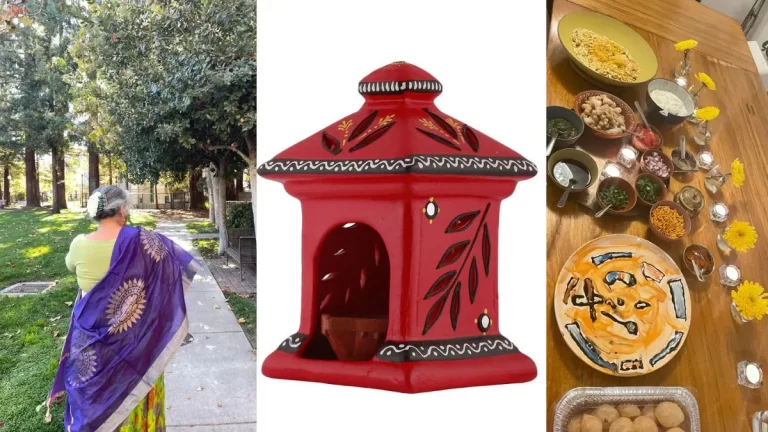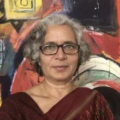
A poet reminisces about what Diwali meant to her growing up in India, and how she has learned to celebrate (differently) in her new homeland.
By Jyoti Bachani
The Anticipation
Growing up in India, Diwali celebrations built up from the excitement over Dussehra and Kali puja. In the weeks leading up to Diwali, the markets were decorated, with lights and tinsel streamers, kandeel/colorful paper lanterns and banners advertising the big Diwali sales that preceded it.
Adults started to clean the home, whitewash it, sell or give away the junk, buy new clothes and kitchen things. They prepared sweets and savories at home and found wholesale market deals for dry fruits by the canisters. These were then delivered to almost everyone they knew, to family and friends, to colleagues and neighbors, cousins and people you wanted to appease in transactional connections. Kids got cash to buy chocolates, firecrackers, or whatever, the parents may have not indulged them with.
The Day Of Diwali
On the day of, as close family gathered together at my grandmas, I remember lighting the candles on all the parapets at dusk. The most serious business of dividing up the bulk-purchased fireworks that came packaged by the dozens very carefully, with some negotiations by age and preference, evenly by consensus, so each cousin had their fair share of phuljharis, anaars, trains, rockets, chakris, hunters, snakes, drop and pistol patakas, red small bombs strung together and green atom-bombs loud enough to only be used individually, with some saved for the adults.
The impatient wait for it to be dark enough to light them, spaced for maximizing the pleasure, all through the evening, by drawing them out and taking time to watch the neighbors light theirs too, since it was all outdoors, littering the streets with paper and burnt leftover bits. Even the access to unlimited sweets and fancy meals and treats would not tempt us indoors as long as there was someone lighting their fireworks in the row of houses.
Tired and cold, the culminating ritual was a small aarti around the home altar with everyone sitting down around it. Sindhis made an altar with a small clay hut, hut-ry, adorned it with flowers and clay oil lamps, and a small bowl of water and milk with rose petals. In them were soaked a couple of silver coins, with Laxmi and Ganesh impressions, that everyone got to touch as part of the ceremony. This was to welcome Laxmi into our clean homes and fresh beginnings for the New Year.
As a kid, all these experiences imprinted a celebratory feeling that stays within, to be summoned up as good times, in lifelong memories.
https://www.youtube.com/watch?v=OfxSpL3LZwI&t=51s
Nostalgic Immigrant
As a young adult, an immigrant in a place where no one even knew what Diwali was, pre-internet times, it was as strange to have none of that, and to even just go to work as a normal workday on the day of Diwali. I gathered my friends around my table for a meal and told them about it. As a young mother, I did presentations in my son’s school with music and food. I recall a fellow parent saying thank you as his daughter, a first grader, had gone home and educated them about the Diwali celebrations in her class, hosted by me. My cousins and friends made it better by hosting and sharing their celebrations here and in London.
Gradually, as awareness spread and friendships grew, with more friends and more time with old friends, we managed to recreate new rituals, for us and our kids, to have some celebratory experiences to mark the importance of this for our culture. These new rituals were different, and mostly on the weekends before or after Diwali, as it’s still a working day as usual.
Years of reinventing, maybe decades or even generations, of adapting is part of being an immigrant. We leave a country behind, but we carry our culture within. Culture, being a dynamic thing, is adapting, here in my adopted country as well as in the old country. Several years ago, many parts of India banned Diwali firecrackers to avoid the pollution.
Adopted Homeland Steps Up
Several years ago, the US president started sending public Diwali greetings on YouTube (maybe Obama was the first) and the Capitol building in DC hosted a celebration. Enough Indians came to build the tech-companies that my neighbors, younger and later immigrants, recreated their Indian experience, with their friends, complete with teen-patti game of cards with cash. I was invited and was the only one who didn’t know the game, as our family never played cards. There is a certain quiet calm that accompanies the continuous letting go required of an immigrant. To move forward, we have to turn our back on some things, even if it’s not easy to do, because it is a package deal.
This Diwali, there seems to be a public global shift in the air that goes way beyond the token Diwali stamp USPS issued a few years ago. Rumor has it that NY might make Diwali a public holiday, for those who celebrate at least.
The UK just chose Rishi Sunak, the son-in-law of India’s business-genius Narayana Murthy, the founder of Infosys. Most of the buzz in Delhi is about the cricket king Virat, who played an amazing game in Melbourne, to defeat Pakistan, in the final over, with all the high emotions between the two nations with a long-standing feud that is exactly like sibling-rivalry in a family drama.
Community Celebrations
The weekend celebrations included a community gathering at the local school, with young and old, music and food, strangers and friends, and henna and temporary tattoos. The 18-year-old spending his first Diwali away from his family skipped the party with his new friends here to join the one remotely with his old circle in Delhi and here with my friends instead.
I indulged him by enduring a round of shopping and enjoying a South Indian wedding feast served on a banana leaf experience. He said he gets the “India-wala feeling” and endured a bit of dancing with his aunt, even saying thanks for not letting him sleep.
He has marched off to school after the morning calls from India to share all the excitement of family gathered there. Bling is on my skin, mithai carried all the way from Udaipur sits in my fridge beside the homemade from scratch, in San Francisco, samosas by a tech-genius, in my fridge. All is right with the world. Happy Diwali.
__________________
 Dr. Jyoti Bachani is an Associate Professor of Strategy and Innovation at Saint Mary’s College of California. She is a former Fulbright Senior Research Scholar, with degrees from London Business School, UK, Stanford, USA, and St. Stephen’s College, India. She translates Hindi poems, and has edited a poetry anthology called “The Memory Book of the Poetry of Diaspora in Silicon Valley.”
Dr. Jyoti Bachani is an Associate Professor of Strategy and Innovation at Saint Mary’s College of California. She is a former Fulbright Senior Research Scholar, with degrees from London Business School, UK, Stanford, USA, and St. Stephen’s College, India. She translates Hindi poems, and has edited a poetry anthology called “The Memory Book of the Poetry of Diaspora in Silicon Valley.”
Courtesy: India Currents (Posted on December 8, 2023) Republished with permission of India Currents